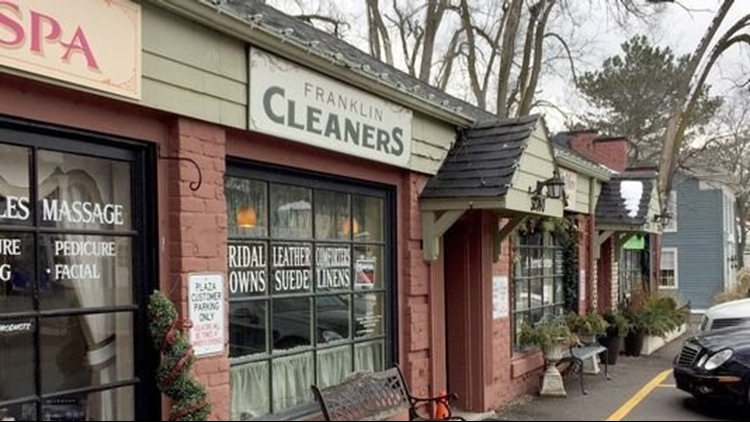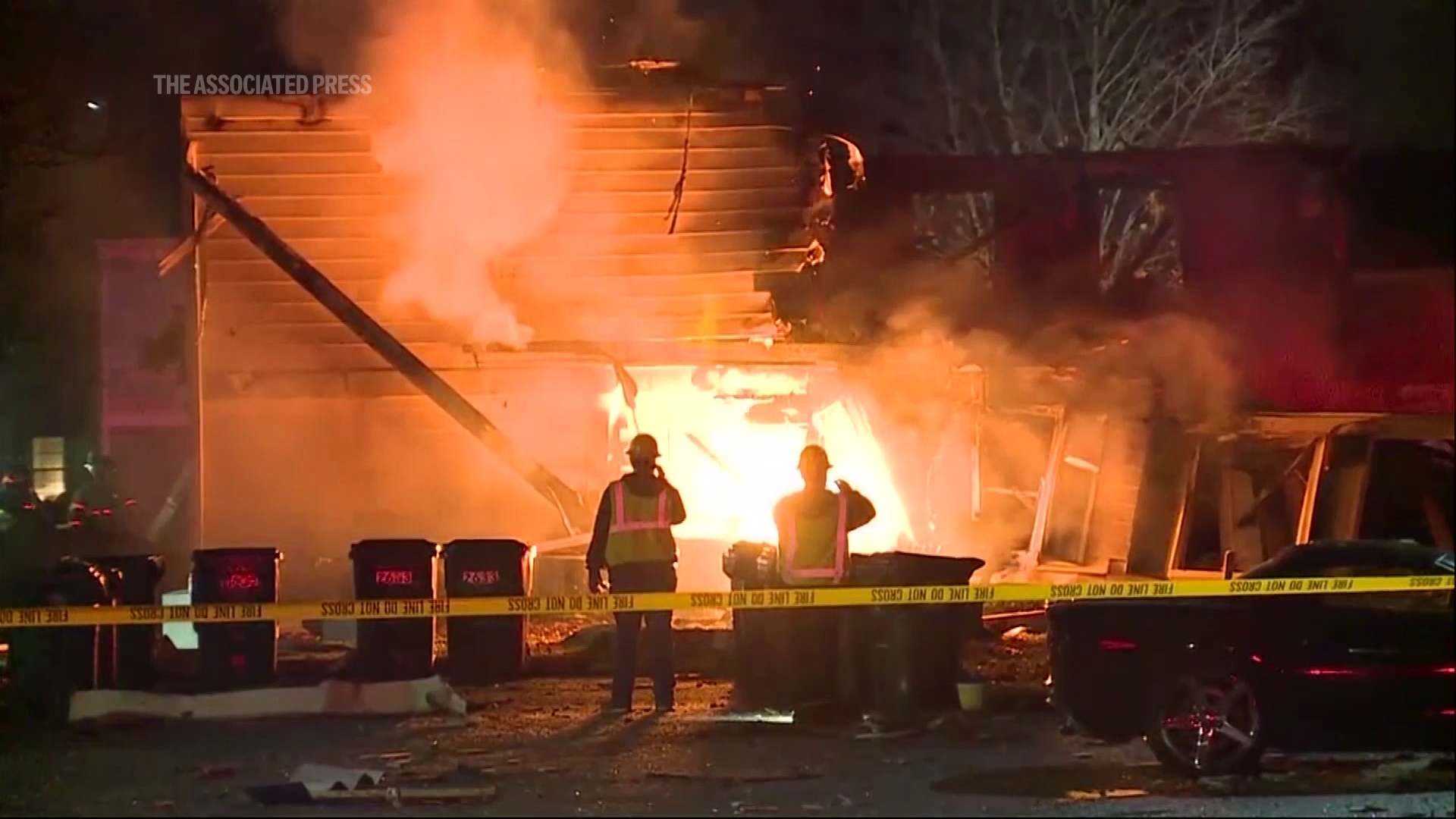The toxic fumes that were seeping into some shops in Oakland County’s upscale Franklin village are all but gone, state environmental officials said.
But a consultant was still conducting tests of the air quality this week inside Franklin Village Plaza, a row of five shops at a 90-year-old building that's a few blocks south of the historic Franklin Cider Mill, and where the Oakland County Health Division on March 6 ordered a mandatory evacuation.
Some of the shop owners were allowed to reopen last week, after the Michigan Department of Environmental Quality directed a contractor to rip up the floor in a tailor's shop, uncovering a long-abandoned tank half-filled with a toxic, cancer-causing solvent.
Technicians in hazmat suits, breathing through respirators, sliced off the top of the four-foot steel tank and removed the solvent, thought to be left from a former dry-cleaning business. That eliminated the retail strip's key source of what pollution fighters call vapor intrusion — the seepage of contaminated air into a building, according to MDEQ.
State officials said there's a teachable moment here from this raw revelation of toxins in affluent Franklin, home to the late billionaire Max Fisher as well as some Detroit Pistons. The lesson? That not even a woodsy area studded with hillside mansions and historic plaques is immune from environmental hazards.
Vapor intrusion is a nationwide problem. Across Michigan, there could be as many as 4,000 sites of vapor intrusion, where harmful fumes — often odorless and invisible — may pose threats to human health, MDEQ Director Heidi Grether said last year. Soon after Grether's warning, the Legislature allocated additional money for tracking down the sites, using old records for locations of defunct businesses. Prime targets? Long-closed gas stations, dry cleaners and metal refinishers, any of which can leave behind underground tanks of chemicals and contaminated soil.
Despite Michigan's increased spending, "it clearly will not be enough" to address the thousands of potential trouble spots, said Todd Fracassi, a partner in the environmental practice group at the Pepper Hamilton law firm in Southfield. Costs for businesses and building owners to comply with air-quality rules can be high and may lead to legal challenges, Fracassi said.
Harmful vapors are known to seep into residential basements as well as commercial buildings, sometimes after traveling horizontally through soil and rock from a distant pollution site, then entering a building through cracks in the foundation. As health researchers learned more about carcinogenic fumes and their effects on human health, regulators repeatedly tightened the government's thresholds for safety, so much so that allowable levels of such pollutants often go unnoticed and can be detected only by special equipment, according to federal websites on air quality.
State officials said Franklin is among 14 high-priority sites in metro Detroit where vapor intrusion is a problem. Half a century or more ago, there was a dry-cleaning shop as well as a gas station on the troubled site in Franklin, with the newfound tank of solvent evidently belonging to a dry cleaner that operated there in the 1930s and '40s, said Kim Ethridge, a project manager for MDEQ’s Remediation and Redevelopment Division in Southeast Michigan.
For that reason, the current owner of the building won't be charged for MDEQ's cleanup costs, which include $150,000 for air testing last fall and about $275,000 for this year's cleanup and the installation in the next month or two of a system to refresh the air continuously inside the building, Ethridge said.
This week, “we’ve downgraded the evacuation to voluntary because there are still some shops that exceed our 12-hour threshold for safe indoor air levels,” possibly from contaminated soil at the back of the site, Ethridge said.
"In the next week or so, we're hopeful we can get the indoor air levels down to where the tenants can reoccupy all of their businesses," she said, adding that "sites like this are proof positive that the Legislature needs to allocate more money" for MDEQ's assault on vapor intrusion.
Besides testing indoor air, MDEQ tested groundwater around the shops for possible contamination. Thankfully, there was none — sure to be a relief to residents of Franklin, who rely on well water, Ethridge said.
Dry cleaners are notorious for leaving trails of pollution. About 35,000 retail dry cleaners operate nationwide, according to the website of the International Fabricare Institute, a trade group based in Silver Spring, Md. That doesn't include untold numbers of former dry cleaners that have come and gone. A rough estimate is that "more than 70% of past and present dry cleaners accidentally or intentionally have released chemicals into the soil or groundwater," according to an online overview by Gary Keyes, vice president of nationwide environmental consultants Arcadis Geraghty & Miller in Denver.
At the quaint little strip small in Franklin, landlord Maria Kim said she never suspected there could be air pollution inside her building. Besides owning the building, she owns Franklin Village Cleaners at the site, and she's relieved to be back open for business, she said this week. Kim does no actual dry-cleaning in Franklin, instead, taking in clothing there to be cleaned elsewhere, according to MDEQ and village officials. Her Franklin Cleaners had no connection to the former dry-cleaning business that once operated there, nor to the worrisome old tank of solvent that has been emptied and sealed up, they said.
“I’m happy that everything’s back to normal, but we’re still waiting for the research,” Kim said, referring to the state’s continued testing of air quality inside her building, which also houses a nail salon, a boutique, an alterations shop and a jewelry maker. Three of the five shops have reopened, while temporary air scrubbers placed by a state contractor refresh the indoor air, said Tony Averbuch, chief of the Franklin-Bingham Farms Fire Department.
“I’m giving MDEQ every credit, with what they faced here," Averbuch said.
"Now, they're working on a long-term solution” — likely to be a permanent system of air pumps, designed to keep indoor air clear of any fumes that still might enter from contaminated soil underneath or behind the building, he said.
“We’re trying to keep that building. It’s real easy to rip things down” — but not so easy to preserve them in a quaint downtown like historic Franklin, Averbuch said.
►Make it easy to keep up to date with more stories like this. Download the WZZM 13 app now.
Have a news tip? Email news@wzzm13.com, visit our Facebook page or Twitter.



